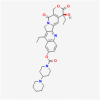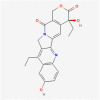The role of UGT1A1 polymorphism in the management of colorectal cancer
- PMID: 40432911
- PMCID: PMC12106485
- DOI: 10.3389/or.2025.1547904
The role of UGT1A1 polymorphism in the management of colorectal cancer
Abstract
Colorectal cancer is a leading cause of cancer related deaths among patients worldwide, necessitating the development of more effective and tolerable therapies. Topoisomerase I inhibitors such as Irinotecan are integral components of chemotherapy regimens used in the management of colorectal, as well as esophageal, gastric, biliary tract, pancreatic, neuroendocrine, small bowel and anal carcinomas. Efficacy and toxicity of these regimens are however impacted by metabolism via the UGT1A1 pathways. This literature review provides a comprehensive overview of UGT1A1 polymorphism in patients with colorectal cancer, including recent developments and the future landscape. Recent literature elucidating the roles of oncogenes and predictive biomarkers on anti-cancer drugs and UGT1A1 genotypes are described. The lack of consensus in the clinical management of patients with colorectal cancer were also explored in depth. A comprehensive search was performed in multiple databases (including PubMed, Embase, Web of Science, Scopus, Research gate, and Google Scholar) to identify relevant articles published up to January 2024. A total of 79 clinical studies were included in this review. The epidemiology and frequency of UGT1A1 genes polymorphisms by race, gender, ethnicity, geographic location and stage of the cancer were correlated with drug metabolism, toxicity, and survival outcomes. The tole of UGT1A1 as a prognostic and predictive biomarker, including existing challenges in clinical application were also discussed extensively.
Keywords: UGT1A; colorectal cancer; irinotecan; pharmacogenenomics and personalised medicine; population.
Copyright © 2025 Babadi, Roudini, Aalipour and Alese.
Conflict of interest statement
The authors declare that the research was conducted in the absence of any commercial or financial relationships that could be construed as a potential conflict of interest.
Figures
Similar articles
-
Examination of multiple UGT1A and DPYD polymorphisms has limited ability to predict the toxicity and efficacy of metastatic colorectal cancer treated with irinotecan-based chemotherapy: a retrospective analysis.BMC Cancer. 2017 Jun 20;17(1):437. doi: 10.1186/s12885-017-3406-2. BMC Cancer. 2017. PMID: 28637434 Free PMC article.
-
Association of UGT1A1*6 polymorphism with irinotecan-based chemotherapy reaction in colorectal cancer patients: a systematic review and a meta-analysis.Biosci Rep. 2020 Oct 30;40(10):BSR20200576. doi: 10.1042/BSR20200576. Biosci Rep. 2020. PMID: 32936306 Free PMC article.
-
The UGT1A9*22 genotype identifies a high-risk group for irinotecan toxicity among gastric cancer patients.Genomics Inform. 2022 Sep;20(3):e29. doi: 10.5808/gi.22051. Epub 2022 Sep 30. Genomics Inform. 2022. PMID: 36239106 Free PMC article.
-
UGT1A1 gene polymorphism is associated with toxicity and clinical efficacy of irinotecan-based chemotherapy in patients with advanced colorectal cancer.Cancer Chemother Pharmacol. 2016 Jul;78(1):119-30. doi: 10.1007/s00280-016-3057-z. Epub 2016 May 24. Cancer Chemother Pharmacol. 2016. PMID: 27220761
-
Irinotecan dosing and pharmacogenomics: a comprehensive exploration based on UGT1A1 variants and emerging insights.J Chemother. 2025 May;37(3):199-212. doi: 10.1080/1120009X.2024.2349444. Epub 2024 May 6. J Chemother. 2025. PMID: 38706404 Review.
References
-
- ACS. Cancer facts & figures 2024. American Cancer Society; (2024).
Publication types
LinkOut - more resources
Full Text Sources



